Douglas Wirls: Landscapes In Pastel On Polyester Film
by Donna Maria De Creeft
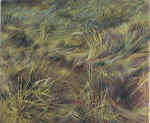
1. Douglas Wirls: "Field"
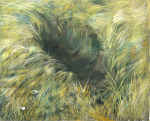
2. Douglas Wirls: "Field II"
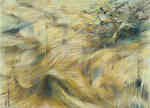
3. Douglas Wirls: "Winter Grass"
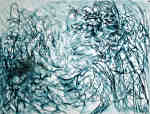
4. Douglas Wirls: "Garden Whorl"
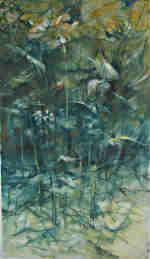
5. Douglas Wirls: "Bad Botany"
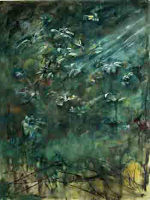
6. Douglas Wirls: "Bad Botany II"
Douglas Wirls's landscapes in pastel on polyester drafting film were on view at The Painting Center, 52 Green Street, New York, NY 10003, from March 1-26, 2005
Created in the studio and not en plein air, Wirls's intensely personal landscapes are remarkable for their veracity. At the same time, they are abstract, in the sense that abstraction can add up to a convincingly authentic representation of reality in the hands of an artist whose vision is anchored in years of keen observation and practice.
Wirls chooses his materials for handling quality rather than hue. The smooth, resistant surface of the drafting film allows him to weave a minimal selection of earth tones into a satisfying range of color with the judicious use of reds and blues.
With dynamic line-work and a muted palette Wirls creates a deft impression of sere, wind-whipped grasses in "Field".
An enigmatic hole appears in a similar composition,"Field II". Possibly the burrow of a wild animal, its depths are unfathomable. Placed in the lower left-hand corner are the only components in any of these works that suggest human presence: two small white shapes that, oddly enough, seem to resist the chthonic pull of the larger mass. "Winter Grass" combines elements of "Field", "Field II" and "Island". Here, Wirls' virtuosity is most apparent when he works against his facility. An umber squiggle, which in another context might bear little reference to reality, limns the tip of a seed-bearing plant. Random crimson marks evoke a prong of sumac and tonal shadings, the silvery pods of spent milkweed. From the bluer end of his palette, comes "Garden Whorl". A monochromatic vortex of gestural lines becomes a backlit perspective on a garden, perhaps in mid-summer when growth threatens to overtake order. Nature's full potential to overwhelm is realized in the impenetrable wall of foliage and spiky, disturbing flora of "Bad Botany I". In "Bad Botany II", the dense, humid shade of is only partially relieved by weak shafts of light.
Wirls' straightforward titles belie the metaphoric content of his work. Sensitive to paradox and irony, he captures the tension between vitality and quiescence, growth and decay, intellectual understanding and emotional experience of nature. A visual artist, particularly one like Wirls, who has spent much solitary time contemplating nature, is uniquely capable of fitting these complexities within the framework of his vision, and imbuing his images, even those that seem obvious like a field of dried grass, with deeper meaning.
Text copyright © 2005 Donna Maria De Creeft
 back to Contents page
back to Contents page